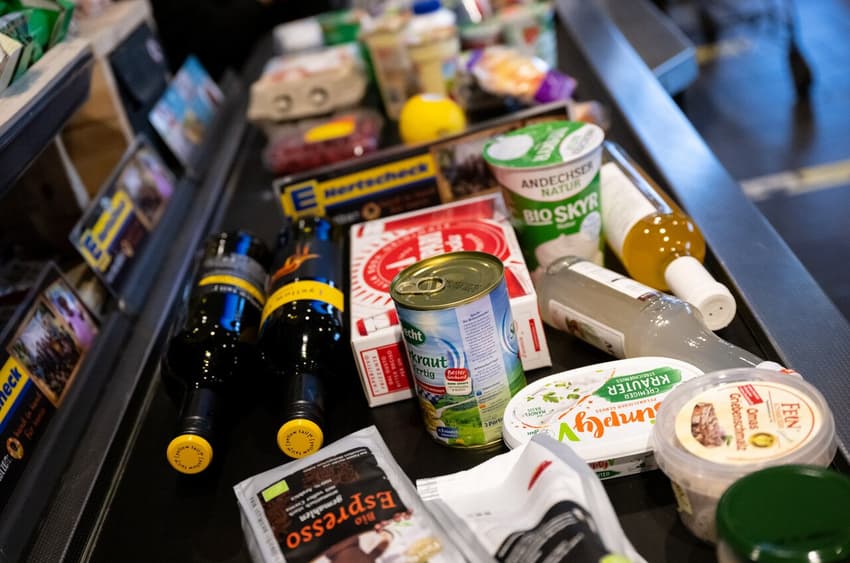Inflation in Germany drops to lowest level in more than a year

Germany's annual inflation rate in May fell to 6.1 percent - its lowest level since March 2022. But prices for some goods remain high.
For many months, consumers in Germany have been grappling with the burden of rising prices. But now there's a glimmer of hope, as inflation rates are continuing to shrink.
According to recent data from the Federal Statistical Office, the inflation rate fell to 6.1 percent in May, marking the lowest level since March 2022.
One key factor contributing to the shrinking inflation rate is the slowdown in price growth for energy. In April, energy prices experienced a notable increase, but in May, the inflation rate for energy dropped to 2.6 percent, down from 6.8 percent in the same period last year.
This can be attributed to the stabilisation of energy prices following the huge surge in prices in the aftermath of the Russian invasion of Ukraine.
However, the shrinking inflation rate is likely to go unnoticed by most consumers: food prices only decreased by 0.3 percent from April to May and increased by 14.9 percent last month compared to May 2022.
Dairy products saw the highest increase, with a rise of over 28 percent, while bread and cereal products became almost 20 percent more expensive compared to a year ago.
Only butter prices dropped significantly, with a price decrease of over 23 percent.
READ ALSO: Why inflation in Germany could slow down despite soaring food prices
In the energy sector, where overall prices have only slightly increased, the variation is similarly high: while natural gas and firewood became approximately a quarter more expensive compared to May 2022, oil products were significantly cheaper. The price of light heating oil fell by over 30 percent, and fuel prices dropped by over 14 percent.
Economists have warned against premature optimism, however, emphasising that the underlying causes of inflation are not fully resolved. Factors such as rising labour costs in various services, particularly within the tourism sector, are expected to contribute to inflationary pressures in the future.
According to experts from the Institute for Macroeconomics and Economic Research (IMK) of the Hans-Böckler Foundation, a further normalisation of inflation can be expected in the coming years. They anticipate that 2023 will see a lower overall inflation rate of more than five percent.
However, it is projected that inflation will only return to its usual level of around 2.5 percent in 2024.
Comments
See Also
For many months, consumers in Germany have been grappling with the burden of rising prices. But now there's a glimmer of hope, as inflation rates are continuing to shrink.
According to recent data from the Federal Statistical Office, the inflation rate fell to 6.1 percent in May, marking the lowest level since March 2022.
One key factor contributing to the shrinking inflation rate is the slowdown in price growth for energy. In April, energy prices experienced a notable increase, but in May, the inflation rate for energy dropped to 2.6 percent, down from 6.8 percent in the same period last year.
This can be attributed to the stabilisation of energy prices following the huge surge in prices in the aftermath of the Russian invasion of Ukraine.
However, the shrinking inflation rate is likely to go unnoticed by most consumers: food prices only decreased by 0.3 percent from April to May and increased by 14.9 percent last month compared to May 2022.
Dairy products saw the highest increase, with a rise of over 28 percent, while bread and cereal products became almost 20 percent more expensive compared to a year ago.
Only butter prices dropped significantly, with a price decrease of over 23 percent.
READ ALSO: Why inflation in Germany could slow down despite soaring food prices
In the energy sector, where overall prices have only slightly increased, the variation is similarly high: while natural gas and firewood became approximately a quarter more expensive compared to May 2022, oil products were significantly cheaper. The price of light heating oil fell by over 30 percent, and fuel prices dropped by over 14 percent.
Economists have warned against premature optimism, however, emphasising that the underlying causes of inflation are not fully resolved. Factors such as rising labour costs in various services, particularly within the tourism sector, are expected to contribute to inflationary pressures in the future.
According to experts from the Institute for Macroeconomics and Economic Research (IMK) of the Hans-Böckler Foundation, a further normalisation of inflation can be expected in the coming years. They anticipate that 2023 will see a lower overall inflation rate of more than five percent.
However, it is projected that inflation will only return to its usual level of around 2.5 percent in 2024.
Join the conversation in our comments section below. Share your own views and experience and if you have a question or suggestion for our journalists then email us at [email protected].
Please keep comments civil, constructive and on topic – and make sure to read our terms of use before getting involved.
Please log in here to leave a comment.